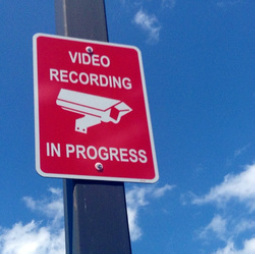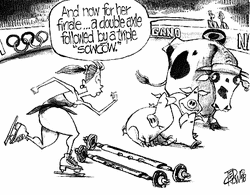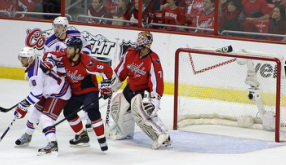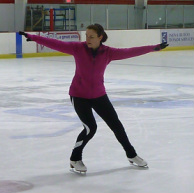 I'm sure everyone has been wondering, "How is Christie's skating coming along?" I mean, it's been 2+ years of lessons now (one 30-minute lesson per week--summers off--and three 90 minute skating sessions per week--again, summers off). So it's time for a check-in to see all the amazing progress. I have been applying principles of sport psychology, using my mental tools to help me learn and develop skills, mentally rehearse and perform with confidence. One tool I had purposely neglected to use--and I had my own good reasons--was videotaping my practices. While videotaping practices and performances has a number of very positive uses for athletes, for me, the idea of possibly seeing that the reality didn't match the beautiful fantasy in my mind, was a slope as slippery as the ice I magically sail upon. Content to use observation of other skaters and my coach as my examples of proper execution, my visualization practice involved seeing myself and my skating from a first-person point of view. I would see the ice, the rink, my skates, from an internal perspective, not third-person the way I actually appear to others. In my images, I perform the skills just as I've seen others perform them. This has been effective in learning the basics, improving my confidence on the ice, and helping the movements to flow a little better. Eager to share my incredible accomplishments, I invited my husband and kids to the rink so they could be blown away by my progress. My husband brought out the video camera, and for once I was OK with it. When I finally watched the video, however, I realized the person on it was not exactly me, or the me I'd imagined in my head. There was definitely vast improvement but I could pick out a lot of things I was not doing well, to put it kindly. The confidence I felt on the inside when on the ice did not show on the video. At first I was devastated by the disconnect and wanted to just throw in the towel. After all, this is just a hobby. But the competitive side of me--and the sport psychologist--searched for the silver lining. I have reached a point in my training where I can stay stagnant or make a great leap forward. It's up to me. I can now integrate video into my active toolkit and make it work for me at a level it could not have when I was a mere beginner. The key for me is to watch with ego firmly detached, and observe from a perspective of learning, tweaking, perfecting. Rather than blissfully practice skills "slightly wrong," when I'm on the ice, I will focus on the aspects of each move and how to perform them perfectly. Practice makes perfect? Only if it is perfect practice. It will require taking a few steps back in order to bound ahead. I actually look forward to getting back out there and practicing with renewed focus. I look forward to my next video, too. Never thought I'd say that.
1 Comment
 This week I wrote an article for coaches on this site about feedback. It addresses the basics, how to give feedback, how much to give, when to give it, how often. As I was writing I reflected upon my own experience with my figure skating coach, Pavel. I know I've written about him before, and his role in my saga from scared-to-death-of-ice to pretty decent skater with a dream or two. He is old school Eastern European, meaning compliments and encouraging words are few and far between. At times it is frustrating, because I wonder why I am paying him when he doesn't say too much. But actually, I know now I am paying him for one big reason--he's good. Really good. Whether he realizes it or not, his style of providing feedback is right in line with the research which says "less is more." He has an allowable "bandwidth" of movements within which I can perform. If I stray, he is on me immediately to correct what I have done. As I have improved, the bandwidth has narrowed. He allows fewer deviations from proper form than he did when I started. For example, when I was just starting, the focus was on balance and gliding. It didn't matter quite as much at that time whether my knees were bent as much as they should have been, only that they were not perfectly straight. My arms could be out to the side, not necessarily at the perfect angle, but mainly to help me learn how they could help me maintain balance and direction. Now, however, I have noticed that if my knees are not bent enough, I am corrected quickly. He has given me more specific detail about where my arms should be, which way I should be looking, keeping my shoulders square to the short wall. With each new skill, the bandwidth for that movement is widened at first, then narrowed appropriately. I complained to him once that he wasn't giving me enough detail about how to perform a movement, what I should be feeling, which muscles to tighten or relax. I am a "thinking person" and like to have as much detail as possible. He is opposed to thinking while skating, but will indulge me if I ask. That is the key. He is holding out, waiting for me to internalize the movement, to get the feel of it myself, to experiment, adjust, and finally learn how to do it all on my own. He notices the adjustments I am making. If he doesn't see any improvement, he will offer suggestions. But mostly, he waits until I ask, which is usually when I haven't been able to figure it out by myself. The learning taking place internally for me, is vital to my success in skating. So the other day at my lesson I mentioned to him how good he is, how his style matches what research suggests brings the most success. He smiled sheepishly and said, "I know this already." Well, he certainly knows it is reflected in his pairs skating team, who recently qualified for Sochi to compete for Estonia! His lessons with me, I'm sure, bring him back down to Earth and check any ego fluctuations. How many of us "know this already" about how to get the most out of our performance? When I talk with people about what I do as a sport psychology consultant, I get a lot of comments such as, "Right! That makes so much sense!" It should. It is, as my mentor from Penn State, Dr. David Collins, used to say, "Common sense not commonly applied." I help people discover what they already have at their disposal, their brilliant and strong minds, and offer ways they can apply mental skills to improve physical performance. We are constantly adjusting to one another, Pavel and I. He gives me a few more "very goods" to keep me happy, and I ask more pointed questions when I need them but not all the time. I am learning, internalizing, and that is the point. Pavel offers a successful learning environment. I apply the mental skills I have learned over the years, and it really helps me improve day to day. Oh, and I have fun, too.  What diehard Caps fan didn't hold his breath or shake her head in disbelief watching super goalie Braden Holtby allow 8 goals on 45 shots as this season started? Who can we count on now? What is going on?? But one person wasn't worried, and that was Holtby himself. Confidence intact, this student of the mental game of hockey understands exactly what is happening, and knows that in a short time he will be all he ever was and more. Even the greatest athletes can find room for improvement, though often are reluctant to make any tweaks or modifications, for fear it will interfere with their continued success. In fact, the changes, if applied, practiced consistently and internalized, will only enhance success in the long run. But the resistance persists for many. An athlete may look to a coach, veteran teammate or professional such as myself, for something they can do to improve, to get the edge over the competition. But if that "thing" is a change in style, position, anything the athlete has been doing for a long time, the walls can go up. It is true that initiating change means what has become a habit needs to be "unlearned" in favor of something new. Research has suggested for anything to become a habit it must be consistently applied for at least 6 weeks. Most athletes say, and rightly so, that they don't have 6 weeks to experiment with their performance. So timing is indeed a consideration. Ideally when an athlete is performing, he wants the movements to be automatic. He shouldn't have to think, just do it. When something new is in the mix, inevitably thinking goes along with it. "Wait, I have to do this instead of that." "Now how was I supposed to stand?" So we need to remove the conscious thought in favor of automatic responses. Holtby has been fortunate to be able to work with goaltending coach Olie Kolzig, himself an outstanding netminder, who has made some "tweaks" to Holtby's game--mainly footwork and positioning. Holtby says, "I think any changes you make that you haven't used your whole life take a little bit of work." And of his slow start, "It's just one of those things that when you start to struggle you go back to your old ways and get in even more trouble." Old ways, old habits, former automatic moves. The key is to make the new moves automatic, to completely replace, write over the old ones. Holtby is an amazing athlete, and fortunately also a willing student, eager to soak up expertise wherever he can find it. Obviously the new elements make sense to him; he has bought in to them. This is a very important point. You need to trust the source of the new information, believe that the changes will indeed work, and completely understand the reasons behind them. Now it is just a matter of making the new elements automatic. Holtby gets it, and will be that much better for embracing the changes. There is no need to fear change in your game if you plan for it, devote yourself to practice it and internalize it to make it automatic. You'll know when you're there, because suddenly there will be no "old ways" to fall back on in a critical moment. I like the saying, "Don't practice until you get it right. Practice until you can't get it wrong." Pure automatic. |
"Even if you are on the right track, you will get run over if you just sit there." Personal Best SportsThe sports world is filled with stories of perseverance, failure and success, personal struggles and public triumph. Each story provides insight into the mental side of sport and activity. Archives
March 2016
Categories
All
|

